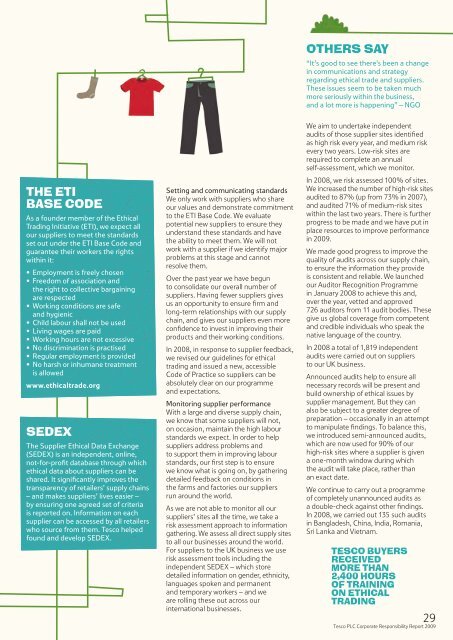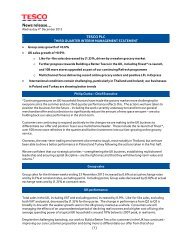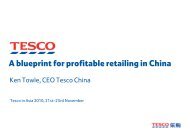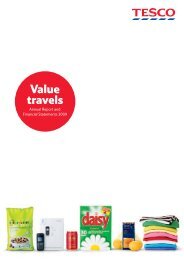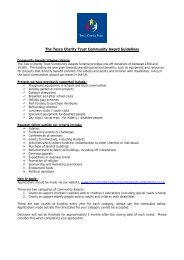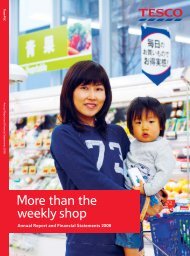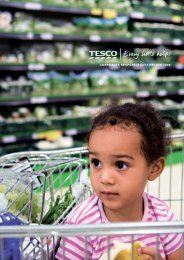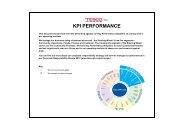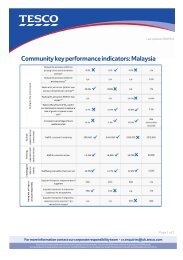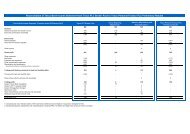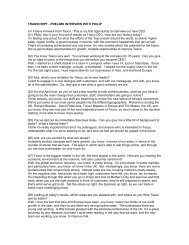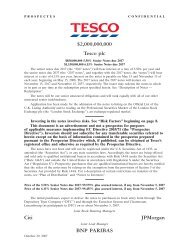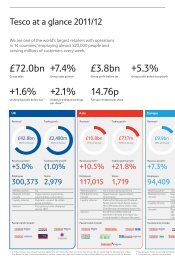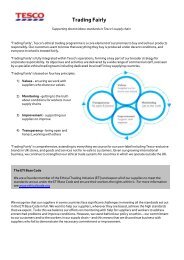Download the 2009 CR Review PDF 6.73MB - Tesco PLC
Download the 2009 CR Review PDF 6.73MB - Tesco PLC
Download the 2009 CR Review PDF 6.73MB - Tesco PLC
Create successful ePaper yourself
Turn your PDF publications into a flip-book with our unique Google optimized e-Paper software.
thE Eti<br />
basE cOdE<br />
As a founder member of <strong>the</strong> Ethical<br />
Trading Initiative (ETI), we expect all<br />
our suppliers to meet <strong>the</strong> standards<br />
set out under <strong>the</strong> ETI Base Code and<br />
guarantee <strong>the</strong>ir workers <strong>the</strong> rights<br />
within it:<br />
• Employment is freely chosen<br />
• Freedom of association and<br />
<strong>the</strong> right to collective bargaining<br />
are respected<br />
• Working conditions are safe<br />
and hygienic<br />
• Child labour shall not be used<br />
• Living wages are paid<br />
• Working hours are not excessive<br />
• No discrimination is practised<br />
• Regular employment is provided<br />
• No harsh or inhumane treatment<br />
is allowed<br />
www.ethicaltrade.org<br />
sEdEX<br />
The Supplier Ethical Data Exchange<br />
(SEDEX) is an independent, online,<br />
not-for-profit database through which<br />
ethical data about suppliers can be<br />
shared. It significantly improves <strong>the</strong><br />
transparency of retailers’ supply chains<br />
– and makes suppliers’ lives easier –<br />
by ensuring one agreed set of criteria<br />
is reported on. Information on each<br />
supplier can be accessed by all retailers<br />
who source from <strong>the</strong>m. <strong>Tesco</strong> helped<br />
found and develop SEDEX.<br />
Setting and communicating standards<br />
We only work with suppliers who share<br />
our values and demonstrate commitment<br />
to <strong>the</strong> ETI Base Code. We evaluate<br />
potential new suppliers to ensure <strong>the</strong>y<br />
understand <strong>the</strong>se standards and have<br />
<strong>the</strong> ability to meet <strong>the</strong>m. We will not<br />
work with a supplier if we identify major<br />
problems at this stage and cannot<br />
resolve <strong>the</strong>m.<br />
Over <strong>the</strong> past year we have begun<br />
to consolidate our overall number of<br />
suppliers. Having fewer suppliers gives<br />
us an opportunity to ensure firm and<br />
long-term relationships with our supply<br />
chain, and gives our suppliers even more<br />
confidence to invest in improving <strong>the</strong>ir<br />
products and <strong>the</strong>ir working conditions.<br />
In 2008, in response to supplier feedback,<br />
we revised our guidelines for ethical<br />
trading and issued a new, accessible<br />
Code of Practice so suppliers can be<br />
absolutely clear on our programme<br />
and expectations.<br />
Monitoring supplier performance<br />
With a large and diverse supply chain,<br />
we know that some suppliers will not,<br />
on occasion, maintain <strong>the</strong> high labour<br />
standards we expect. In order to help<br />
suppliers address problems and<br />
to support <strong>the</strong>m in improving labour<br />
standards, our first step is to ensure<br />
we know what is going on, by ga<strong>the</strong>ring<br />
detailed feedback on conditions in<br />
<strong>the</strong> farms and factories our suppliers<br />
run around <strong>the</strong> world.<br />
As we are not able to monitor all our<br />
suppliers’ sites all <strong>the</strong> time, we take a<br />
risk assessment approach to information<br />
ga<strong>the</strong>ring. We assess all direct supply sites<br />
to all our businesses around <strong>the</strong> world.<br />
For suppliers to <strong>the</strong> UK business we use<br />
risk assessment tools including <strong>the</strong><br />
independent SEDEX – which store<br />
detailed information on gender, ethnicity,<br />
languages spoken and permanent<br />
and temporary workers – and we<br />
are rolling <strong>the</strong>se out across our<br />
international businesses.<br />
OthERs say<br />
“It’s good to see <strong>the</strong>re’s been a change<br />
in communications and strategy<br />
regarding ethical trade and suppliers.<br />
These issues seem to be taken much<br />
more seriously within <strong>the</strong> business,<br />
and a lot more is happening” – NGO<br />
We aim to undertake independent<br />
audits of those supplier sites identified<br />
as high risk every year, and medium risk<br />
every two years. Low-risk sites are<br />
required to complete an annual<br />
self-assessment, which we monitor.<br />
In 2008, we risk assessed 100% of sites.<br />
We increased <strong>the</strong> number of high-risk sites<br />
audited to 87% (up from 73% in 2007),<br />
and audited 71% of medium-risk sites<br />
within <strong>the</strong> last two years. There is fur<strong>the</strong>r<br />
progress to be made and we have put in<br />
place resources to improve performance<br />
in <strong>2009</strong>.<br />
We made good progress to improve <strong>the</strong><br />
quality of audits across our supply chain,<br />
to ensure <strong>the</strong> information <strong>the</strong>y provide<br />
is consistent and reliable. We launched<br />
our Auditor Recognition Programme<br />
in January 2008 to achieve this and,<br />
over <strong>the</strong> year, vetted and approved<br />
726 auditors from 11 audit bodies. These<br />
give us global coverage from competent<br />
and credible individuals who speak <strong>the</strong><br />
native language of <strong>the</strong> country.<br />
In 2008 a total of 1,819 independent<br />
audits were carried out on suppliers<br />
to our UK business.<br />
Announced audits help to ensure all<br />
necessary records will be present and<br />
build ownership of ethical issues by<br />
supplier management. But <strong>the</strong>y can<br />
also be subject to a greater degree of<br />
preparation – occasionally in an attempt<br />
to manipulate findings. To balance this,<br />
we introduced semi-announced audits,<br />
which are now used for 90% of our<br />
high-risk sites where a supplier is given<br />
a one-month window during which<br />
<strong>the</strong> audit will take place, ra<strong>the</strong>r than<br />
an exact date.<br />
We continue to carry out a programme<br />
of completely unannounced audits as<br />
a double-check against o<strong>the</strong>r findings.<br />
In 2008, we carried out 135 such audits<br />
in Bangladesh, China, India, Romania,<br />
Sri Lanka and Vietnam.<br />
tEscO buyERs<br />
REcEiVEd<br />
mORE than<br />
2,400 hOuRs<br />
Of tRaining<br />
On Ethical<br />
tRading<br />
29<br />
<strong>Tesco</strong> <strong>PLC</strong> Corporate Responsibility Report <strong>2009</strong>


